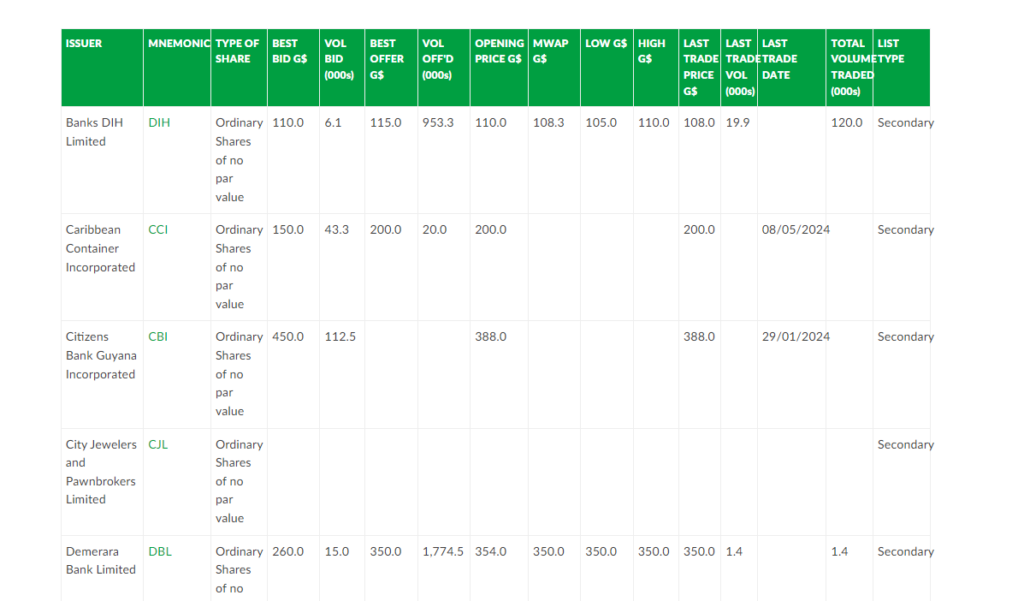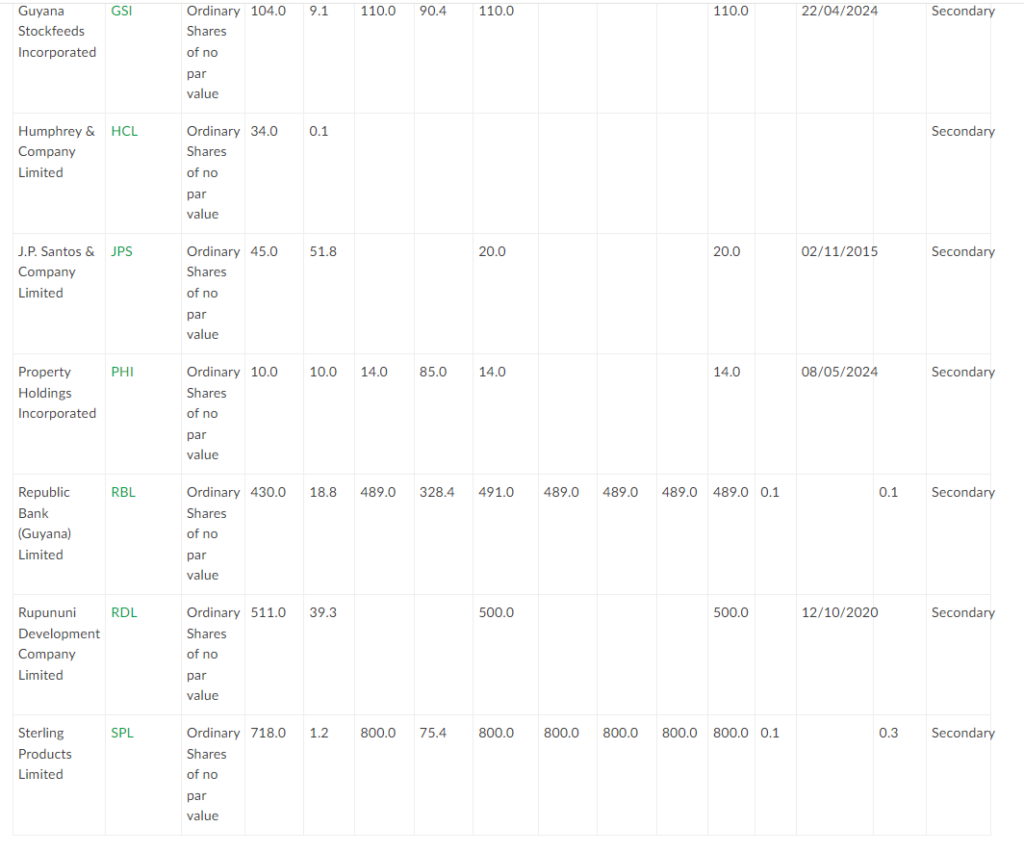How to Trade on the Stock Market in Guyana
Exploring Stock Brokers in Guyana and How to Trade on the Stock Market
Table of Contents
Investing in the stock market can be a lucrative way to grow your wealth, and in Guyana, there are several reputable stock brokers who can facilitate your trading needs. Whether you’re a seasoned investor or just starting, understanding the role of stock brokers and the process of trading is essential. This blog post will guide you through the key stock brokers in Guyana and the steps to buy and sell shares on the stock exchange.
Leading Stock Brokers in Guyana
1. Beharry Stockbrokers Limited
Address: 191 Charlotte St, Lacytown, Georgetown, Guyana, South America
Tel: (592) 227-2526, (592) 227-1349, (592) 225-0632-5
Fax: (592) 225-6062
Beharry Stockbrokers Limited, a subsidiary of Edward B. Beharry and Company Limited, is a licensed financial institution under the Bank of Guyana. They offer brokerage services including the buying and selling of stocks and shares.
2. Hand-In-Hand Trust Corporation Inc.
Address: 62-63 Middle Street, North Cummingsburg, Georgetown, Guyana
Tel: (592) 226-9781-4
Fax: (592) 226-9971
Hand-In-Hand Trust Corporation Inc. provides a range of trust and brokerage services. They are part of the Hand-in-Hand Group of Companies, offering a robust platform for investors.
3. Guyana Americas Merchant Bank Incorporated
Address: GBTI Corporate Office, High and Young Streets, Kingston, Georgetown, Guyana
Tel: (592) 223-5193/4
Fax: (592) 223-5195
Guyana Americas Merchant Bank Inc., a subsidiary of the Guyana Bank For Trade and Industry, offers non-depository financial services and brokerage, registered under the Securities Industry Act.
4. Trust Company (Guyana) Limited
Address: 11 Lamaha Street, Queenstown, Georgetown, Guyana, South America
Tel: (592) 227-2654-7, (592) 227-2659
Fax: (592) 227-2828
The Trust Company (Guyana) Limited, formerly a subsidiary of the Royal Bank of Canada, offers comprehensive financial services including traditional trusteeship, investment, brokerage, and more.
How to Trade on the Stock Market in Guyana
1. Setting Up an Account
To start trading, you need to contact a broker and set up an account. This typically involves providing identification and, in some cases, making an initial deposit.
2. Placing an Order
Once your account is set up, you can place an order to buy or sell shares. This can often be done over the phone or through an online platform provided by the broker.

3. Order Types
Limit Orders: You specify the price at which you want to buy or sell.
Discretionary Orders: You give the broker the discretion to get the best possible price.
Best Orders: You are prepared to trade at the current market price.

4. Matching Orders
Your broker will try to match your order with an opposing order in-house or through the exchange. If they find a match, they execute the trade and report it to the Guyana Association of Securities Companies and Intermediaries (GASCI).
5. Settlement
Trades are settled between brokers on a designated settlement date, adhering to the principle of delivery versus payment, ensuring that stocks are only delivered when payment is received.
How to Learn More and Reach Out
For those interested in diving deeper into the stock market or needing assistance, here are some ways to get in touch:
Beharry Stockbrokers Limited:
Visit: 191 Charlotte St, Lacytown, Georgetown, Guyana
Call: (592) 227-2526
Fax: (592) 225-6062
Hand-In-Hand Trust Corporation Inc.:
Visit: 62-63 Middle Street, North Cummingsburg, Georgetown, Guyana
Call: (592) 226-9781-4
Fax: (592) 226-9971
Guyana Americas Merchant Bank Incorporated:
Visit: GBTI Corporate Office, High and Young Streets, Kingston, Georgetown, Guyana
Call: (592) 223-5193/4
Fax: (592) 223-5195
Trust Company (Guyana) Limited:
Visit: 11 Lamaha Street, Queenstown, Georgetown, Guyana
Call: (592) 227-2654-7
Fax: (592) 227-2828
Navigating the stock market requires the right knowledge and partners. By choosing a reliable stock broker and understanding the trading process, you can effectively participate in Guyana’s growing financial market. For more information or personalized assistance, feel free to reach out to any of the brokers listed above.
Pros and Cons of Trading the Stock Market in Guyana
Investing in the stock market can be a powerful way to build wealth, but it’s essential to weigh the advantages and disadvantages before diving in. In Guyana, the stock market offers unique opportunities and challenges. Here are the key pros and cons of trading in the Guyanese stock market.
Pros of Trading the Stock Market in Guyana
1. Growing Economy
Guyana’s economy is experiencing significant growth, particularly due to the burgeoning oil and gas industry. This growth can lead to increased profitability for publicly traded companies, providing investors with potentially high returns.
2. Emerging Market Opportunities
As an emerging market, Guyana offers unique investment opportunities that might not be available in more developed markets. Early investors can benefit from the rapid expansion and development of local companies.
3. Diversification
Investing in the Guyanese stock market allows for diversification of investment portfolios. This can reduce risk by spreading investments across various sectors and companies within the country.
4. Local Knowledge Advantage
Investors residing in Guyana or those with in-depth knowledge of the local market can leverage their understanding of the local economic conditions, cultural factors, and business environment to make informed investment decisions.
5. Supportive Regulatory Environment
The Guyana Securities Council and the Guyana Association of Securities Companies and Intermediaries (GASCI) provide a regulatory framework that helps protect investors and maintain market integrity. Licensed brokers, such as Beharry Stockbrokers Limited and Hand-In-Hand Trust Corporation Inc., are required to adhere to these regulations, ensuring a level of security for traders.
Cons of Trading the Stock Market in Guyana
1. Market Volatility
Like many emerging markets, the Guyanese stock market can be highly volatile. Economic fluctuations, political instability, and other factors can lead to significant price swings, which can be risky for investors.
2. Limited Market Size
The Guyanese stock market is relatively small compared to more established markets. This can result in lower liquidity, meaning that it might be more challenging to buy and sell shares quickly without affecting the stock price.
3. Information Asymmetry
Access to timely and accurate information can be more challenging in Guyana compared to larger markets. Limited transparency and the availability of financial data can make it difficult for investors to perform thorough due diligence.
4. Currency Risk
Investing in Guyanese companies involves currency risk. Fluctuations in the exchange rate between the Guyanese dollar and other currencies can impact the value of investments, particularly for foreign investors.
5. Infrastructure and Technological Limitations
The trading infrastructure in Guyana might not be as advanced as that in more developed markets. This can affect the efficiency of trade execution and access to real-time market data.
Balancing the Pros and Cons
When considering trading in the Guyanese stock market, it’s crucial to balance these pros and cons. The potential for high returns and unique investment opportunities must be weighed against the risks associated with market volatility, limited size, and information availability.
For investors willing to navigate these challenges, the Guyanese stock market can offer rewarding opportunities. Engaging with reputable brokers such as Beharry Stockbrokers Limited, Hand-In-Hand Trust Corporation Inc., Guyana Americas Merchant Bank Incorporated, and Trust Company (Guyana) Limited can provide the necessary support and guidance to make informed investment decisions.
Alternative Ways to Make Money in the Stock Market in Guyana
The stock market in Guyana offers a variety of avenues for investors to grow their wealth. Beyond the traditional approach of buying and holding stocks, there are several alternative strategies that can yield substantial returns. This article explores these alternative ways to make money in the Guyanese stock market.
1. Dividend Investing
What is Dividend Investing? Dividend investing involves purchasing shares of companies that regularly pay dividends. Dividends are portions of a company’s earnings distributed to shareholders, typically on a quarterly basis.
Benefits:
Steady Income: Provides a regular income stream, which can be reinvested or used as cash flow.
Lower Risk: Dividend-paying stocks are often more stable and less volatile.
Compounding Returns: Reinvesting dividends can significantly boost long-term returns.
How to Get Started: Investors should look for well-established companies listed on the Guyana stock exchange with a history of consistent and increasing dividend payouts.
2. Trading Options
What are Options? Options are financial derivatives that give investors the right, but not the obligation, to buy or sell a stock at a predetermined price within a specific timeframe.
Benefits:
Flexibility: Options can be used to hedge risks or to speculate on stock price movements.
Leverage: Options allow investors to control a large amount of stock with a relatively small investment.
How to Get Started: Options trading requires a good understanding of the market and the specific terms of the contracts. Engaging with brokers like Beharry Stockbrokers Limited or Hand-In-Hand Trust Corporation Inc. can provide the necessary guidance.
3. Participating in IPOs
What is an IPO? An Initial Public Offering (IPO) is the first sale of stock by a private company to the public. Investors can buy shares at the initial offering price before the stock is traded on the open market.
Benefits:
Early Entry: Investing in IPOs can provide an opportunity to buy shares at a potentially lower price before they are available to the broader market.
High Growth Potential: Newly listed companies may experience significant price appreciation if they perform well.
How to Get Started: Investors need to stay informed about upcoming IPOs in Guyana. Contacting brokers like Guyana Americas Merchant Bank Incorporated can help you participate in these opportunities.
4. Using Exchange-Traded Funds (ETFs)
What are ETFs? ETFs are investment funds that hold a collection of stocks and are traded on the stock exchange. They offer exposure to various sectors or indices.
Benefits:
- Diversification: ETFs provide exposure to a wide range of assets, reducing the risk associated with individual stocks.
- Cost-Effective: ETFs often have lower fees compared to mutual funds.
How to Get Started: Research available ETFs that include Guyanese stocks or regional indices. Brokers can assist in purchasing ETFs that align with your investment strategy.
5. Engaging in Market Arbitrage
What is Market Arbitrage? Arbitrage involves buying and selling the same asset in different markets to profit from price discrepancies.
Benefits:
- Low Risk: When executed correctly, arbitrage can yield risk-free profits.
- Quick Returns: Arbitrage opportunities typically require short holding periods.
How to Get Started: Arbitrage requires real-time access to market data and quick execution. Partnering with experienced brokers and utilizing advanced trading platforms is crucial for success.
6. Investing in Mutual Funds
What are Mutual Funds? Mutual funds pool money from multiple investors to buy a diversified portfolio of stocks, bonds, or other securities.
Benefits:
- Professional Management: Funds are managed by professional fund managers, making it easier for investors to benefit from expert insights.
- Diversification: Mutual funds provide a diversified investment, reducing risk.
How to Get Started: Investors should seek out mutual funds that focus on the Guyanese market or regional investments. Trust Company (Guyana) Limited offers a variety of financial services, including mutual fund investments.
Comparing Stock Trading to Forex Trading in Guyana: How to Get Started with Forex Trading Using OctaFX
Investing in financial markets is a popular way to build wealth, and in Guyana, two primary avenues are stock trading and forex trading. Both have unique advantages and challenges. This article will compare stock trading and forex trading in Guyana and provide suggestions on how to get started in forex trading using the OctaFX broker.
Stock Trading in Guyana
Pros:
- Ownership: Buying stocks means owning a piece of a company, which can lead to dividends and voting rights.
- Capital Appreciation: Potential for significant returns if the company grows.
- Dividend Income: Regular income from dividends, which can be reinvested.
- Regulated Market: The Guyana Securities Council and GASCI provide regulatory oversight, enhancing investor protection.
Cons:
- Market Size: The Guyanese stock market is relatively small, limiting investment options.
- Liquidity: Lower liquidity can make it challenging to buy or sell stocks quickly.
- Volatility: Stock prices can be volatile, influenced by company performance and economic conditions.
- Information Access: Limited availability of timely and accurate financial data.
Forex Trading in Guyana
Pros:
- Liquidity: The forex market is the largest and most liquid market in the world, making it easier to enter and exit trades.
- 24-Hour Market: Forex trading is available 24 hours a day, five days a week, providing flexibility for traders.
- Leverage: Forex brokers offer high leverage, allowing traders to control large positions with relatively small capital.
- Global Market: Exposure to international currencies and economies can diversify investment portfolios.
Cons:
- High Risk: Leverage can amplify losses as well as gains, leading to significant financial risk.
- Market Volatility: Currency prices can be highly volatile, influenced by global economic and political events.
- Complexity: Forex trading requires a deep understanding of market dynamics, technical analysis, and economic indicators.
- Regulation: While there are global regulatory bodies, the forex market is less centralized than stock markets, which can increase risk.
Getting Started with Forex Trading Using OctaFX
OctaFX is a popular online broker known for its user-friendly platform and supportive trading environment, making it a good choice for beginners in Guyana.

Steps to Get Started with OctaFX:
- Research and Education:
- Learn the Basics: Understand forex trading fundamentals, including currency pairs, leverage, and risk management.
- Use Educational Resources: OctaFX offers a range of educational materials, including webinars, tutorials, and articles, to help you get started.
- Open an Account:
- Visit the OctaFX Website: Go to OctaFX’s official website and sign up for an account.
- Complete Registration: Provide the necessary personal information and verify your identity as required.
- Choose the Right Account Type:
- Demo Account: Start with a demo account to practice trading without risking real money. OctaFX provides a demo account with virtual funds.
- Live Account: Once comfortable, open a live account. OctaFX offers various account types with different features to suit your trading style.
- Fund Your Account:
- Deposit Funds: Use the available payment methods to deposit money into your OctaFX account. Be sure to start with an amount you can afford to lose.
- Promotions: Check for any deposit bonuses or promotions that OctaFX might offer to boost your initial capital.
- Download the Trading Platform:
- MetaTrader 4 or 5: OctaFX supports both MetaTrader 4 (MT4) and MetaTrader 5 (MT5), popular trading platforms known for their robust features and user-friendly interfaces.
- Mobile App: For on-the-go trading, download the OctaFX mobile app available for both iOS and Android.
- Develop a Trading Plan:
- Set Goals: Define your trading goals, risk tolerance, and preferred trading strategies.
- Risk Management: Use tools like stop-loss and take-profit orders to manage risk effectively.
- Start Trading:
- Analyze the Market: Use technical and fundamental analysis to make informed trading decisions.
- Execute Trades: Place trades through the OctaFX platform, monitor your positions, and adjust as necessary.
- Seek Support:
- Customer Service: OctaFX offers 24/7 customer support to assist with any issues or questions.
- Community and Forums: Engage with the trading community through forums and social media to share experiences and strategies.
Conclusion
Both stock trading and forex trading offer unique opportunities for investors in Guyana. Stock trading provides ownership and potential for dividends, while forex trading offers high liquidity and 24-hour market access. For those interested in forex trading, OctaFX is a reliable broker that provides the necessary tools and support to get started. By following the steps outlined above, you can embark on your forex trading journey with confidence.
Also read How to Remove Backgrounds from Photos for Free and Make Money
![]()





Pingback: Do This and You can Make Money Every Day in Guyana - Guyana Jobs
Comments are closed.